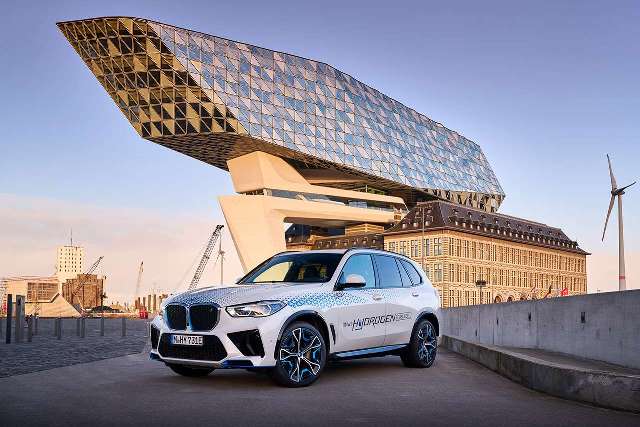
Launch of the BMW iX5 Hydrogen pilot fleet
The first BMW iX5 Hydrogen vehicles are now on the roads. In the course of the year, the pilot fleet will be used worldwide by various target groups for trial and demonstration purposes. This will give the development team valuable practical knowledge about the vehicle and the everyday use of pioneering, hydrogen fuel cell technology.
The hydrogen fuel cell system developed and produced by BMW is further evidence of the leading development expertise the BMW Group has in the area of electric drive technologies. The BMW Group is systematically advancing the development of hydrogen fuel cell technology as a future option for the locally emissions-free individual mobility of the future.
BMW Group accelerates the transformation of the mobility sector.
Oliver Zipse, Chairman of the Board of Management of BMW AG, has also emphasised the extraordinary importance of this innovative drive system: “Hydrogen is a versatile energy source that has a key role to play in the energy transition process and therefore in climate protection. After all, it is one of the most efficient ways of storing and transporting renewable energies. We should use this potential to also accelerate the transformation of the mobility sector.”
To unlock this potential of hydrogen to the best possible effect, the BMW Group is producing highly efficient fuel cell systems at its own Munich-based centre of excellence for hydrogen. This technology is one of the most important components in the BMW iX5 Hydrogen and will sustainably influence the transformation of the entire mobility sector – and enhance it: “Hydrogen is the missing piece in the jigsaw when it comes to emission-free mobility. One technology on its own will not be enough to enable climate-neutral mobility worldwide,” comments Oliver Zipse.

Fuel cell systems: fascinating and highly efficient at the same time.
The BMW Group is an absolute pioneer in the area of hydrogen fuel cell technology, and is advancing this exciting development on an ongoing basis. In this process, a chemical reaction takes place in the fuel cell between the gaseous hydrogen from the tanks and the oxygen from the ambient air. A uniform supply of these two media to the membrane in the fuel cell is crucial for high drive efficiency.
The BMW Group has developed special hydrogen components for the new fuel cell system to complement technological analogies to the combustion engine such as the intercooler, air filter, control units and sensor technology.
These include for example a high-revving compressor with turbine or a high-voltage coolant pump. There are two stages in fuel cell production: first, the individual fuel cells are piled up to create a fuel cell stack. Then, all the other components are fitted to form a complete fuel cell system.
The BMW Group receives individual fuel cells from the Toyota Motor Corporation. These two companies have been collaborating successfully for many years, and have been working together on fuel cell drives since as early as 2013.
Rapid refuelling and great range.
In combination with a highly-integrated drive unit in the fifth-generation BMW eDrive technology on the rear axis, as well as high-performance battery developed specifically for the BMW iX5 Hydrogen with lithium-ion technology, the powertrain of this vehicle brings maximum output of 295 kW / 401 hp to the road. In drive and brake phases, this electric machine also takes on the function of a generator that feeds power back into a high-performance battery.
The gaseous hydrogen required to supply the fuel cell is stored in two 700-bar tanks made from carbon-fibre-reinforced plastic (CFRP). Together, they hold six kilograms of hydrogen, giving the BMW iX5 Hydrogen a range of 504 km in the WLTP cycle. Refuelling the hydrogen tanks takes only three to four minutes, meaning that the BMW iX5 Hydrogen delivers the driving pleasure you expect from BMW with just a few, short interim stops, even on long routes.
Information Source: Read More “
Energy Monitors , Electric Power , Natural Gas , Oil , Climate , Renewable , Wind , Transition , LPG , Solar , Electric , Biomass , Sustainability , Oil Price , Electric Vehicles,

